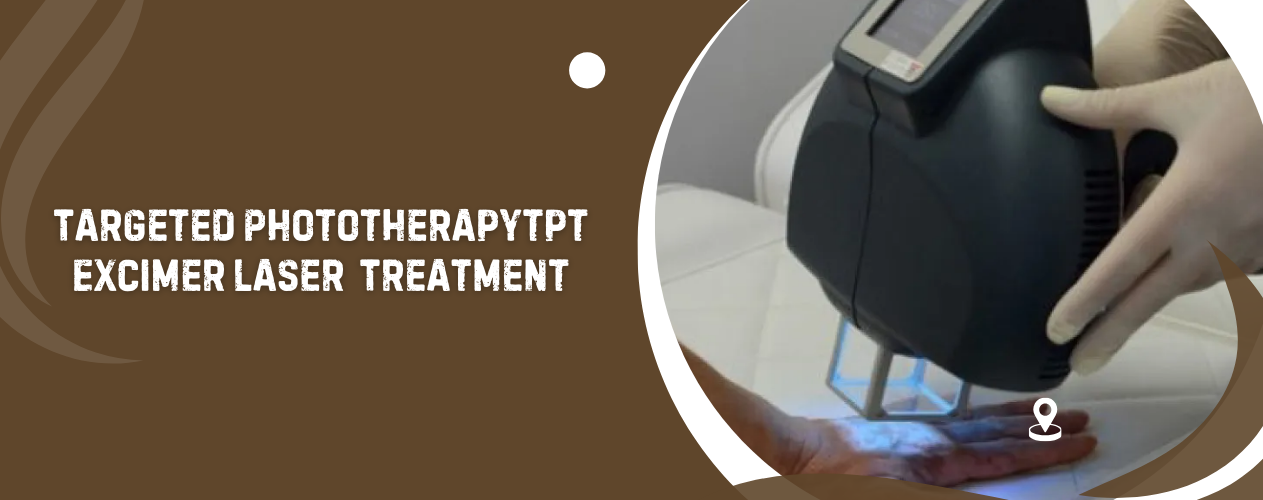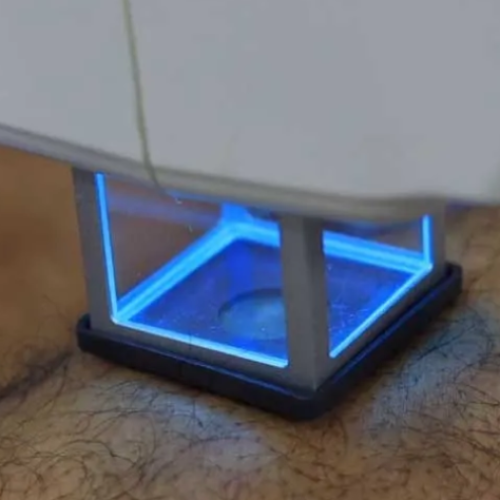
Targeted Phototherapytpt Excimer Laser Treatment
Targeted Phototherapy (TPT) at Nirvana Skin, Hair and Laser Clinic in Jhansi is an advanced skin treatment that utilizes light or ultraviolet (UV) radiation to effectively treat skin lesions. Unlike traditional broad-spectrum phototherapy, TPT employs Excimer laser technology to deliver precise beams of UV light directly to the affected areas. This focused approach enhances treatment efficacy by concentrating therapeutic effects on the lesions while minimizing exposure to surrounding healthy skin.
The precision of TPT offers several benefits, including shorter treatment times and fewer sessions compared to conventional methods. It is particularly effective for conditions such as psoriasis, vitiligo, and eczema, where localized lesions benefit from direct and concentrated UV exposure. The specialized delivery mechanisms ensure optimal targeting, leading to improved treatment outcomes and increased patient satisfaction.

Skin Lesions: TPT is specifically designed to treat localized skin lesions, such as those associated with psoriasis, vitiligo, and eczema. The targeted approach allows for effective treatment of these conditions by delivering therapeutic UV light directly to the affected areas.
Excimer Laser Technology: TPT utilizes Excimer laser technology, which emits precise, focused beams of UV light. This technology is crucial for targeting specific lesions while minimizing exposure to surrounding healthy skin, thereby reducing potential side effects.
Enhanced Treatment Efficacy: The targeted nature of TPT enhances the efficacy of treatment by concentrating the therapeutic effects on the lesions. This focused delivery improves outcomes compared to traditional broad-spectrum phototherapy, which may not provide the same level of precision.
Minimized Side Effects: By limiting UV exposure to only the affected areas, TPT helps reduce the risk of adverse effects commonly associated with broader phototherapy methods, such as skin damage or irritation in healthy tissue.
Shorter Treatment Times: The precision of TPT allows for reduced treatment times and fewer sessions compared to conventional phototherapy methods. This is beneficial for patients seeking effective treatment with minimal disruption to their schedules.
Mechanism of Action: TPT works by inducing a controlled inflammatory response in the skin, which can help modulate immune function and promote healing in conditions like psoriasis and eczema. The UV light also helps to slow down the rapid growth of skin cells associated with these disorders.
Patient-Specific Conditions: Dermatologists may recommend TPT based on individual patient conditions and responses to previous treatments, making it a tailored approach for managing chronic skin issues effectively.
Redness: Mild redness at the treatment site is common and usually indicates an inflammatory response. This redness typically subsides within a few hours to a couple of days.
Sensitivity: Patients may experience increased sensitivity in the treated area, which can include a tingling or burning sensation during or shortly after treatment.
Dryness and Peeling: The skin may become dry or start to peel as it heals, which is a normal part of the exfoliation process following phototherapy.
Itching: Some individuals may experience itching in the treated areas, which can be a result of skin irritation from the UV light exposure.
Swelling: Mild swelling may occur around the treatment site but typically resolves quickly.
Changes in Skin Color: Temporary changes in pigmentation, such as darkening or lightening of the skin in the treated area, may occur but usually normalize over time.
Photosensitivity:Increased sensitivity to sunlight may develop after treatment, making it essential for patients to use sunscreen and avoid excessive sun exposure.
Flare-Up of Skin Conditions: In some cases, pre-existing skin conditions may temporarily worsen before improving as a result of the treatment.
Pain or Discomfort: While TPT is generally well-tolerated, some patients may experience mild pain or discomfort during the procedure, which usually subsides shortly after.
Fatigue: Some individuals report feeling fatigued after treatment sessions, although this is less common.
Precision Treatment: TPT utilizes Excimer laser technology to deliver focused beams of UV light directly to affected areas, allowing for precise targeting of skin lesions while minimizing exposure to surrounding healthy skin. This precision enhances treatment efficacy.
Reduced Treatment Times: The targeted nature of TPT often results in shorter treatment sessions and fewer overall sessions compared to traditional broad-spectrum phototherapy, making it more convenient for patients.
Effective for Specific Conditions: TPT is particularly effective for managing localized skin conditions such as psoriasis, vitiligo, and eczema. The concentrated UV exposure allows for better outcomes in these conditions.
Minimized Side Effects: By focusing treatment on specific lesions, TPT reduces the risk of side effects commonly associated with broader phototherapy methods, such as skin damage or irritation in healthy tissue.
Improved Patient Satisfaction: The enhanced efficacy and reduced side effects often lead to higher patient satisfaction rates, as individuals experience better results with less discomfort.
Enhanced Skin Healing: TPT promotes skin healing by inducing a controlled inflammatory response, which can help modulate immune function and promote the repair of damaged skin.
Convenience and Comfort: Many patients find TPT more comfortable than traditional phototherapy options due to its targeted approach and shorter treatment durations.
Long-Term Benefits: Regular TPT sessions can lead to long-term improvements in skin health, including sustained remission of chronic conditions like psoriasis and eczema.
Minimal Downtime: Patients typically experience minimal downtime following TPT sessions, allowing them to resume normal activities quickly.
Customizable Treatment Plans: Dermatologists can tailor TPT protocols based on individual patient needs, lesion characteristics, and treatment goals, ensuring optimal outcomes.
Frequently Ask Question
Targeted Phototherapy, also known as Excimer Laser therapy, is a non-invasive treatment that uses ultraviolet (UV) light to target specific areas of the skin. It is most commonly used to treat skin conditions like psoriasis, vitiligo, eczema, and other inflammatory skin diseases. The Excimer Laser emits a concentrated beam of UVB light, which is directed precisely at the affected areas, allowing for effective treatment with minimal side effects.
The Excimer Laser works by emitting a highly focused beam of UVB light (usually at 308 nm) to the affected area. This targeted light helps to slow down the overproduction of skin cells, reduce inflammation, and promote normal skin cell turnover, leading to improvement in conditions like psoriasis, vitiligo, and eczema. The treatment is precise, delivering UV light only to the damaged skin without affecting the surrounding healthy tissue.
Excimer Laser therapy is commonly used to treat the following conditions:
- Psoriasis: A chronic autoimmune disease that causes skin cells to multiply rapidly, leading to scaly, red patches.
- Vitiligo: A condition that causes loss of skin pigment, leading to white patches on the skin.
- Eczema (Atopic Dermatitis): A condition that causes itchy, inflamed skin.
- Vitiligo: Targeted treatment can help restore pigment to white patches of skin.
- Lichen Planus: An inflammatory skin condition causing itchy, purple, flat-topped bumps.
Excimer laser treatments are generally not painful. Most patients report feeling a mild warmth or a slight tingling sensation during the procedure, but it is not typically described as painful. If needed, a numbing cream can be applied to sensitive areas to increase comfort.
Each treatment session usually lasts between 5 and 15 minutes, depending on the size and location of the area being treated. Multiple small areas may be treated during one session.
Nirvana Skin, Hair & Laser Clinic
The clinic provides a range of dermatological and hair treatments. It’s advisable to call ahead for an appointment or for more specific information about services and availability.

